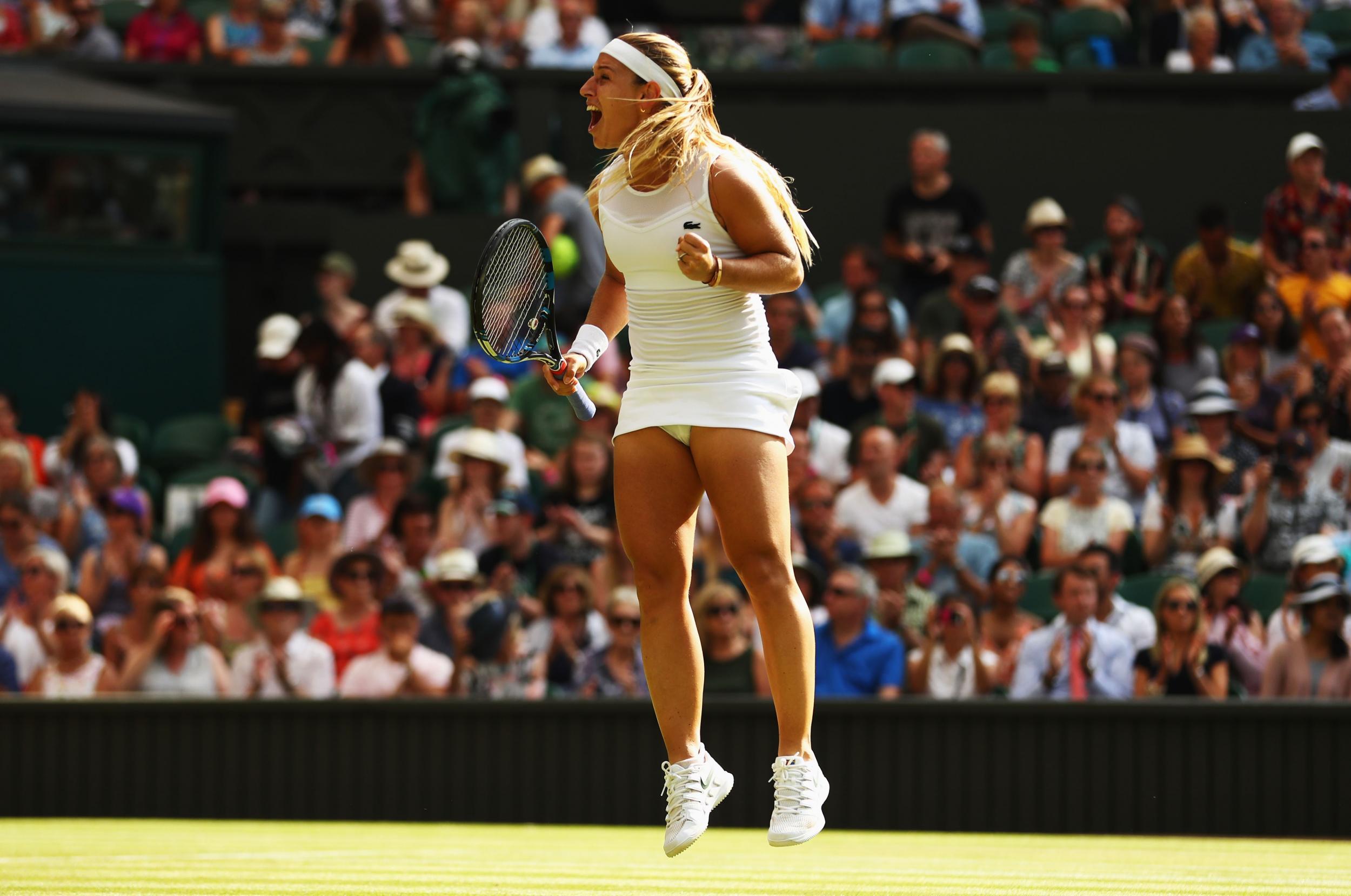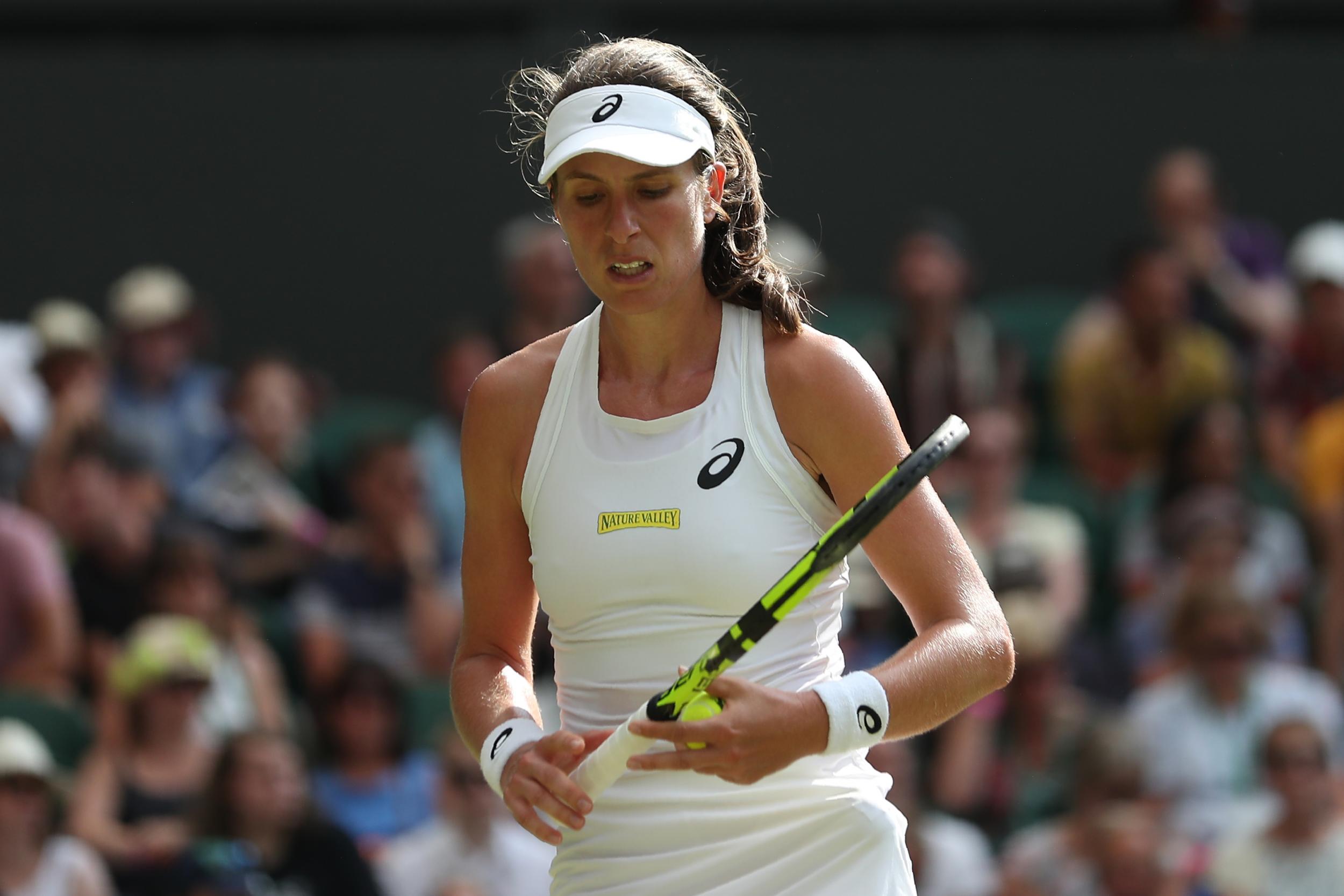Wimbledon 2018: Johanna Konta's Championships campaign comes to early end after Dominika Cibulkova defeat
The British No 1 was beaten 6-3 6-4 by the Slovakian

Centre Court has been the stage for some of Johanna Konta’s finest moments, but a return to the sport’s most famous arena failed to arrest the 27-year-old Briton’s continuing slide down the world order.
Twelve months after becoming the first British woman to reach the Wimbledon semi-finals for 39 years, Konta was beaten 6-3, 6-4 on Thursday in the second round by Slovakia’s Dominika Cibulkova. Having reached a career-high position of No 4 in the world rankings last July, the current world No 24 is set to drop out of the top 40 at the end of this tournament.
Konta, who was the last British woman left in singles competition following Katie Boulter’s defeat earlier in the day, was unable to find the form that had propelled her to memorable victories over Donna Vekic and Simona Halep on the same court last summer, though that was largely down to her opponent’s exceptional play.
Cibulkova, who packs a bigger punch than her 5ft 3in frame might suggest she is capable of, is an experienced campaigner and a feisty competitor. The 28-year-old Slovakian, who struck the ball consistently throughout, did not hold back on her noisy celebrations on some of the bigger points and leaped into the air with a scream of joy at the end.
Although Cibulkova denied afterwards that she had been out to prove a point, the quality of her performance was a reminder that she would have been seeded had the All England Club not decided to seed Serena Williams despite the American’s low world ranking. It was Konta’s misfortune to meet the world No 33 on a day when she played more like the woman who reached the Australian Open final four years ago and was once No 4 in the rankings.
Konta herself can be one of the game’s most consistent ball-strikers, but there were too many rallies in which the Briton got on top but failed to deliver the knock-out blow. Cibulkova, who made just nine unforced errors to Konta’s 17, defended well throughout and kept making her opponent hit the extra ball.
Cibulkova had to defend only one break point in the whole match, while Konta, whose serve is one of her biggest strengths, faced seven break points, two of which the Slovakian converted.
Konta gave credit to Cibulkova. “When she's playing well, she really goes for her shots,” the Briton said afterwards. “She looks to dictate. When she's playing well, she plays incredibly freely.
“She was hitting winners from five metres behind the baseline. She was obviously seeing the ball very well and feeling very good in the way she wanted to play. I found it very difficult to really get a foothold into the match. That was a lot to do with how she played.”

Konta was not unhappy with her own performance. “I felt there were actually some things that I did quite well,” she said. “I thought I served quite decently. I felt I also adjusted my positioning to how she was serving.I thought I adapted reasonably well to try to really get into the match.”
The British No 1 denied that the weight of the public’s expectations had had any effect on her. “I'm here to satisfy my own expectations, and I'm very clear on where I am in my development, where I am with my level,” she said.
“I love playing here. I will love it next year. I will love it for however many more years I get to play. That is regardless of what external factors or media people say about me, because that's something that's very much out of my control.”
The last time Konta had played on Centre Court was when she lost to Venus Williams in last year’s semi-finals. At that stage the Briton’s career had been on an upward curve for two years, but since then her fortunes have been in decline.
Konta dropped to No 9 in the world rankings at the end of last year and then fell out of the top 20 after failing to defend her title at the Miami Open in April. Wim Fissette, who was her coach for less than a year but guided her to some of her biggest victories, was replaced in December by Michael Joyce, who used to work with Maria Sharapova.

Cibulkova was also in the world’s top 10 last summer and has been trying to arrest a similar slide down the rankings. She has never gone beyond the quarter-finals here, but has now reached the third round eight times in the last 10 years.
Although Konta had plenty of support from the Centre Court crowd, the atmosphere never approached the fever-pitch levels it had reached when she was hitting the heights last year.
In the first set the only break of serve came in the sixth game. Cibulkova wasted her first chance when she netted a backhand volley but on the second Konta’s missed backhand gave the Slovakian her break.
Having served out for the opening set, Cibulkova broke again in the third game of the second as Konta lost four points in a row from 40-15 up.
Serving to stay in the match at 3-5, Konta finally found some inspiration, saving two match points from 15-40 down with some bold hitting. She saved two more with big serves and eventually won the game with an ace, but Cibulkova served out to love in the following game to claim victory after just 78 minutes.
Konta said afterwards that she was not concerned about the fact that her fall down the world rankings would mean she is not seeded in forthcoming tournaments.
“I think this Wimbledon is another demonstration of how seeding is not the be all and end all,” she said. “[It shows] the depth we have in the women's game, how players can play very well in any certain match. I am not terribly worried about losing a number next to my name.”
Konta also said she did not believe her game had regressed since last year.“I actually feel like I'm heading in the direction I want to be heading in,” she said. “I think I'm improving. I think sooner or later those results will come.”
Join our commenting forum
Join thought-provoking conversations, follow other Independent readers and see their replies
Comments